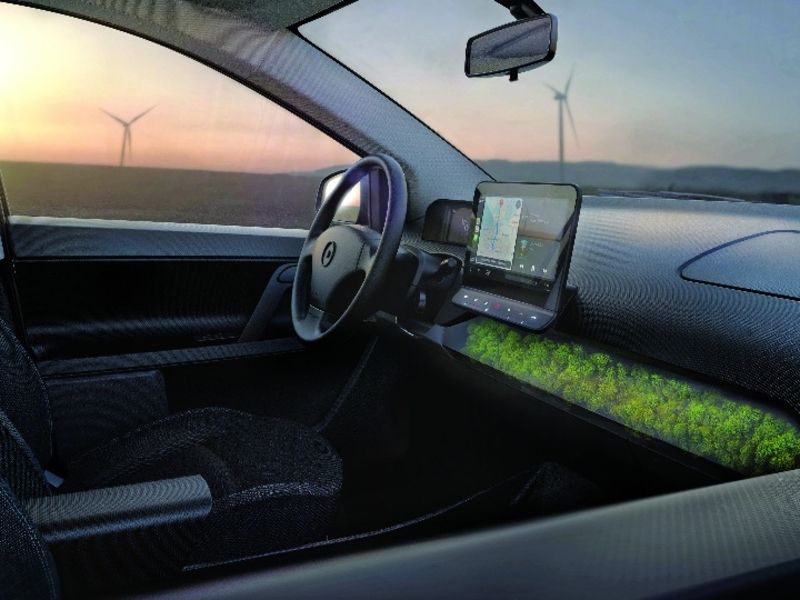
Nearly 2,000 companies will participate in this year’s virtual version of CES, the annual technology showcase normally held in Las Vegas. While the likes of General Motors and Mobileye may be the headliners in the auto- tech realm, here’s a look at five startups worth keeping an eye on both during this week’s event and beyond.
Sono Motors
A year after Sono Motors embarked on a crowdfunding campaign to continue work on its Sion model prototype — and succeeded in raising more than $44 million — the company will unveil its second-generation solar-electric vehicle during CES.
The Sion’s liquid-cooled battery has a capacity of 35 kilowatt-hours, which provides a range of 158.4 miles per charge.
That’s certainly less than more-established competitors, but the solar-charging capabilities can provide an additional 17 miles of range per day while the car is in use, boosting its daily-driver competency.
“This journey started in a garage with a simple idea and has become a great force thanks to the overwhelming support of our community,” said Laurin Hahn, CEO of Sono Motors, who co-founded the company in 2013.
Kodiak Robotics
When self-driving trucks first reach the road in large numbers, they may not drive from warehouse to warehouse, but from “truckport” to “truckport.”
That’s the approach envisioned by startup Kodiak Robotics, which foresees a first wave of autonomous trucks that handle driving on interstates or other major highways but will require a human driver to make it from the highway to the ultimate destination.
Kodiak says focusing specifically on highway travel reduces the complexity of autonomous operations. It’s a philosophy that others have noticed — Kodiak received an Innovation Award from CES officials last month. The company, founded in 2018 by former Uber engineer Don Burnette, has emphasized simulation development while also testing trucks on Interstate 45 between Dallas and Houston.
The company is expected to announce new milestones during CES.
Sibros
Software might be the future of the auto industry. But automakers have learned it can be a hassle to manage.
Enter Sibros, a San Jose, Calif., startup that has developed a platform that addresses that concern. The company’s Deep Connectivity Platform is a hub for managing live data collection from vehicles, analytics from that data and over-the-air software updates.
As the industry continues to play catch-up with Tesla’s over-the-air capabilities, such a platform could accelerate those efforts, particularly as software-related problems make up a greater proportion of vehicle safety recalls.
Sibros — which was founded by former Faraday Future, Tesla and Uber executives — closed a $12 million Series A funding round in July 2020.
NoTraffic
Reducing congestion entails more than reducing the number of vehicles on the road.
Efficiency could be wrung if traffic signals had a better sense of when demand existed for a change in lights and adjusted their signals accordingly. No more waiting at a red lights at midnight on empty roads.
That’s the aim of NoTraffic, a Tel Aviv startup that developed an artificial intelligence-based traffic-signal platform that can analyze traffic flow and spur signal changes. While competitors offer similar products that work at individual intersections, NoTraffic CEO Tal Kreisler says the company’s platform can coordinate efficient signal phasing at multiple intersections at once.
The company launched a pilot project in Maricopa County, Ariz., in 2020 and intends to expand to approximately 40 locations throughout the U.S. this year.
Adasky
Keeping in mind that Teledyne announced an $8 billion acquisition of thermal-imaging company FLIR just last week, one particular company worth watching might be night-vision upstart Adasky.
The Israeli startup first appeared at CES last year. This time around, Adasky is introducing its latest thermal camera. Called Viper, it is a smaller camera that can detect objects at up to 300 meters, about 328 yards, and classify living beings at more than 200 meters, or 219 yards. CES named the company an Innovation Award honoree for the improved performance.
At a time when the auto industry is searching for ways to make pedestrian-detection systems more competent, thermal cameras may become a compelling part of their solution.